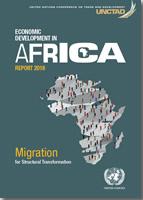
Images of thousands of African youth drowning in the Mediterranean, propelled by poverty or conflict at home and lured by the hope of jobs abroad, have fed a misleading narrative that migration from Africa harms rather than helps the continent. The latest edition of the UNCTAD flagship Economic Development in Africa Report takes aim at this preconceived notion and assesses the evidence to identify policy pathways that harness the benefits of African migration and mitigate its negative effects.
This year, 2018, offers the international community a historic opportunity to realize the first global compact for migration, an intergovernmentally negotiated agreement in preparation under the auspices of the United Nations. Our contribution to this historic process is the Economic Development in Africa Report 2018: Migration for Structural Transformation.
Migration benefits both origin and destination countries across Africa. The report argues that African migration can play a key role in the structural transformation of the continent’s economies. Well-managed migration also provides an important means for helping to achieve the Sustainable Development Goals, both in Africa and beyond.
The report adopts an innovative, human-centred narrative that explores how migrants contribute to structural transformation and identifies opportunities for absorption of extra labour in different sectors across the continent. African migrants include from highly skilled to low-skilled persons, who migrate through legal channels and otherwise.
These migrants not only fill skills gaps in destination countries, but also contribute to development in their origin countries. Children remaining in the origin country of a migrant parent are also often more educated than their peers, thanks to their parent’s migration. The connections that migrants create between their origin and their destination countries have led to thriving diaspora communities. They have also opened up new trade and investment opportunities that can help both destination countries and origin countries to diversify their economies and move into productive activities of greater added value.
Contrary to some perceptions, most migration in Africa today is taking place within the continent. This report argues that this intra-African migration is an essential ingredient for deeper regional and continental integration. At the same time, the broad patterns of extra-continental migration out of Africa confirm the positive contribution of migrants to the structural transformation of origin countries.
We believe this report offers new and innovative analytical perspectives, relevant for both long-term policymaking and for the design of demand-driven technical cooperation projects, with a shorter time frame and will help Governments and other stakeholders in reaching informed decisions on appropriate migration policies in the context of Africa’s regional integration process.
It is our hope that these findings will improve policy approaches to migration for African Governments, as well as for migration stakeholders outside the continent.

Secretary-General of UNCTAD


